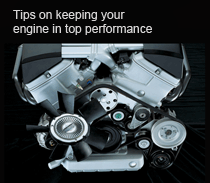
…and extend the life of your vehicle.
1. Change the Oil
Changing your oil at regular intervals keeps the interior of the engine cleaner, lubricates the engine and catches and removes combustion elements that are destructive to the engine. Prolonging oil change intervals can cause these destructive, suspended particles to “sludge up” the engine. This is the simplest and least expensive (yet most important) service you can do to extend the life of your car.
2. Change the Air Filter for the Engine and the Cabin
If your air filter gets too dirty or clogged, your engine won’t be able to suck enough air into the combustion chambers. The engine will then run rich (i.e. too much gas and not enough air). When this happens gas mileage suffers. Many new cars also have an air filter for the ventilation system commonly referred to as a cabin air filter. This filter can cause a host of problems if it gets too plugged up; and we have seen many completely clogged with leaves and dirt. While permanent damage is unlikely it is still possible, so a clean air filter is an easy way to keep your vehicle running smoothly.
3. Perform Tire Maintenance
Regular tire rotation and proper inflation will not only lengthen the life of the tires, but also increase fuel mileage. Check out our new nitrogen tire service; it can extend the life of your tires, save on gas mileage and it helps the environment. See the flip side of this flyer for more on nitrogen.
4. Flush the Cooling System
Flushing the cooling system prolongs the life of the radiator, engine and heater by washing away corrosive elements like dirt and rust particles that can clog up the cooling system and cause problems in winter and summer. This should be done every two years.
5. Replace the Spark Plugs
Replacing the spark plugs in your engine can prevent misfires and poor performance as well as dramatically decrease emissions and improve gas mileage.
6. Maintain the Brakes
If you neglect your brake pads and shoes, your brakes will ultimately fail. Even before that happens you can cause damage to other, more expensive brake parts such as rotors, drums and calipers. An annual brake inspection can find potential problems before they become a major expense. Brake fluid should also be flushed once every two years.
7. Change the Transmission Fluid
Changing your transmission fluid at regular intervals (recommended by the manufacturer) can extend the life of the transmission by 50%. If you perform this service on a regular basis chances are you may never experience a major transmission failure.
8. Perform a Fuel Injection Service
Performing a fuel injection service not only prolongs the life expectancy of the injectors, but can increase fuel mileage with benefits that far outweigh the cost of the service.
9. Replace the Timing Belt
Replacing the timing belt, before it breaks can save you hundreds of dollars. Most manufacturers recommend replacement between 60,000 and 105,000 miles depending on make and model. On some engines, when a timing belt breaks, the piston can crash into an open valve causing serious engine damage by bending valves and breaking pistons. If the belt fails, the engine will immediately shut down leaving you stranded.
When replacing the timing belt it is less expensive to change the water pump at the same time. The rationale for this is that 90% of the labor to change the water pump has already been done with the timing belt job and we consider it good insurance to replace the pump at this time.
10. Perform an Annual or Seasonal Complete Vehicle Inspection
Having your vehicle inspected periodically can prolong the life of many major components of your vehicle by diagnosing repair issues before they become major problems, but don’t assume that getting your oil changed at a “quick lube” comes with a thorough inspection. Request a copy of the check list and compare for yourself.
Schedule a Service Appointment!